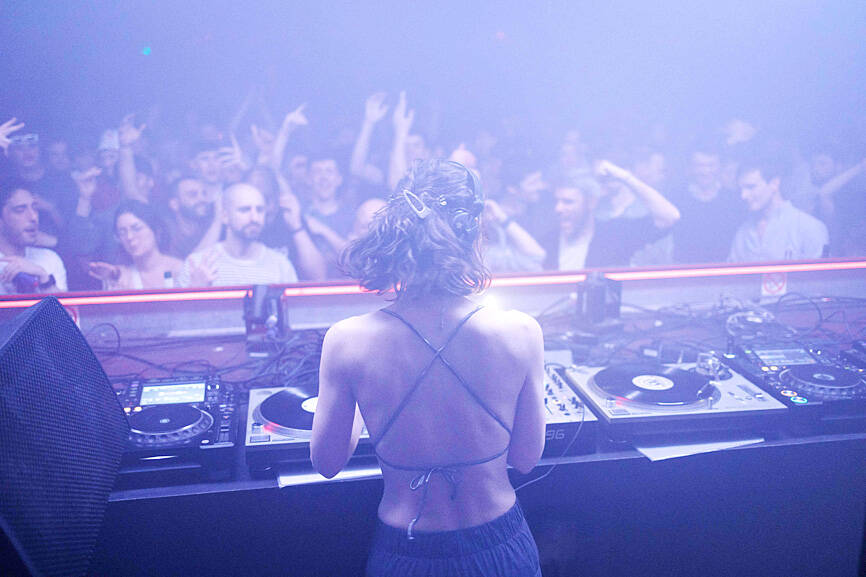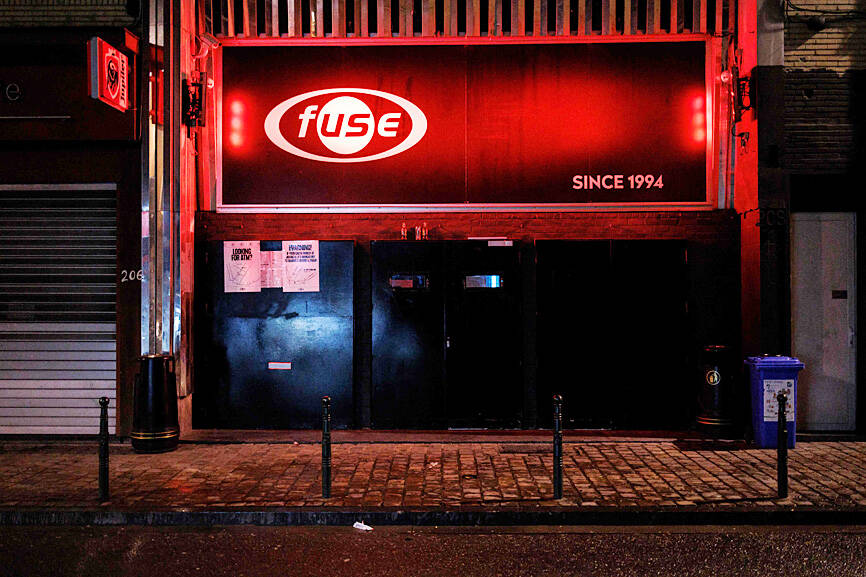For 30 years, the Brussels nightclub Fuse has stood as a temple to Europe’s legions of electro-techno fans, a venue where the likes of Daft Punk and Aphex Twin set the concrete-walled dance floor thumping.
However, those thumps are increasingly the source of tensions with neighbors who want more restful nights. It is a tussle — between youthful cultural exuberance and city-center gentrification, a clash of generations and lifestyles — seen in many of the world’s capitals. It is one that hangs heavy over Fuse as it celebrates its three decades of existence.
Throughout this year, the nightclub is emphasizing its cultural status by bringing out a memorial book and a vinyl compilation by top artists. It is also launching a global club tour of 10 cities that is to include Amsterdam, Berlin, Barcelona and London, all under the banner “30 years of making noise.”

Photo: AFP
The celebration is backed by big-name sponsors — international soft drink brands and Belgian beer brewers — and Brussels city politicians who hold Fuse up as a world-class “monument.”
Yet some residents in Fuse’s Marolles district — a formerly working-class neighborhood gone hipster — would be happier to see all that as a crescendo before a definitive fade to silence.
“It’s tougher and tougher for clubs to exist in city centers,” said DJ Pierre — real name Pierre Noisiez — who is one of a roster filling Fuse with sound since it started in 1994.

Photo: AFP
“If you get rid of them, you end up with a city center that is dead, which no one wants,” he said.
The club’s management has lashed out at noise complaints being made that threaten “the oldest techno club in Belgium.”
Fuse was forced to close for three weeks in January last year after complaints from one neighbor prompted authorities to swoop in with noise restrictions.
“It really breaks my heart,” DJ Charlotte de Witte, a Belgian who is one of the global stars of the techno scene, said of the order.
Since then, there have been “two new complaints from neighbors,” said the club’s artistic director, Steven Van Belle, who added that the problem was not going away.
“It’s still a hot topic, but the authorities are working on more protections for us,” he said.
Last year’s January closure triggered a spectacular backlash uniting artists, nightclub-goers and politicians.
Several months later, in July, “clubbing” culture was added to the list of intangible heritage for the Brussels region — alongside beer and Belgium’s fritkot stands that sell French fries. The symbolic move was a direct consequence of Fuse’s dilemma.
Closing Fuse would have “imperiled all nightlife” in Brussels, said an aide to the official, Ans Persoons, in charge of the city’s heritage.
With the listing, “the neighbors also have to adapt to what is considered part of the heritage.”
The classification — which is distinct from the internationally recognized UNESCO heritage list — applies to “at least 100 places” in the Brussels region, according to the nightlife federation that lobbied for it.
Twenty Belgian nightclubs, late-hour bars, concert venues and open-air dance festivals round out the list.
To balance their activity — which often spurs the local economy in the areas they are located in — against living standards other residents are entitled to, Brussels regional authorities have drawn up new urban rules to be followed.
They cover planning permits and sound isolation requirements, as well as obligations for the venue’s users — and for direct neighbors.
Van Belle said he was awaiting formalization of those rules, to see them become law once they are voted on by the regional parliament.

Application-specific integrated circuit designer Faraday Technology Corp (智原) yesterday said that although revenue this quarter would decline 30 percent from last quarter, it retained its full-year forecast of revenue growth of 100 percent. The company attributed the quarterly drop to a slowdown in customers’ production of chips using Faraday’s advanced packaging technology. The company is still confident about its revenue growth this year, given its strong “design-win” — or the projects it won to help customers design their chips, Faraday president Steve Wang (王國雍) told an online earnings conference. “The design-win this year is better than we expected. We believe we will win

Intel Corp chief executive officer Lip-Bu Tan (陳立武) is expected to meet with Taiwanese suppliers next month in conjunction with the opening of the Computex Taipei trade show, supply chain sources said on Monday. The visit, the first for Tan to Taiwan since assuming his new post last month, would be aimed at enhancing Intel’s ties with suppliers in Taiwan as he attempts to help turn around the struggling US chipmaker, the sources said. Tan is to hold a banquet to celebrate Intel’s 40-year presence in Taiwan before Computex opens on May 20 and invite dozens of Taiwanese suppliers to exchange views

Chizuko Kimura has become the first female sushi chef in the world to win a Michelin star, fulfilling a promise she made to her dying husband to continue his legacy. The 54-year-old Japanese chef regained the Michelin star her late husband, Shunei Kimura, won three years ago for their Sushi Shunei restaurant in Paris. For Shunei Kimura, the star was a dream come true. However, the joy was short-lived. He died from cancer just three months later in June 2022. He was 65. The following year, the restaurant in the heart of Montmartre lost its star rating. Chizuko Kimura insisted that the new star is still down

While China’s leaders use their economic and political might to fight US President Donald Trump’s trade war “to the end,” its army of social media soldiers are embarking on a more humorous campaign online. Trump’s tariff blitz has seen Washington and Beijing impose eye-watering duties on imports from the other, fanning a standoff between the economic superpowers that has sparked global recession fears and sent markets into a tailspin. Trump says his policy is a response to years of being “ripped off” by other countries and aims to bring manufacturing to the US, forcing companies to employ US workers. However, China’s online warriors